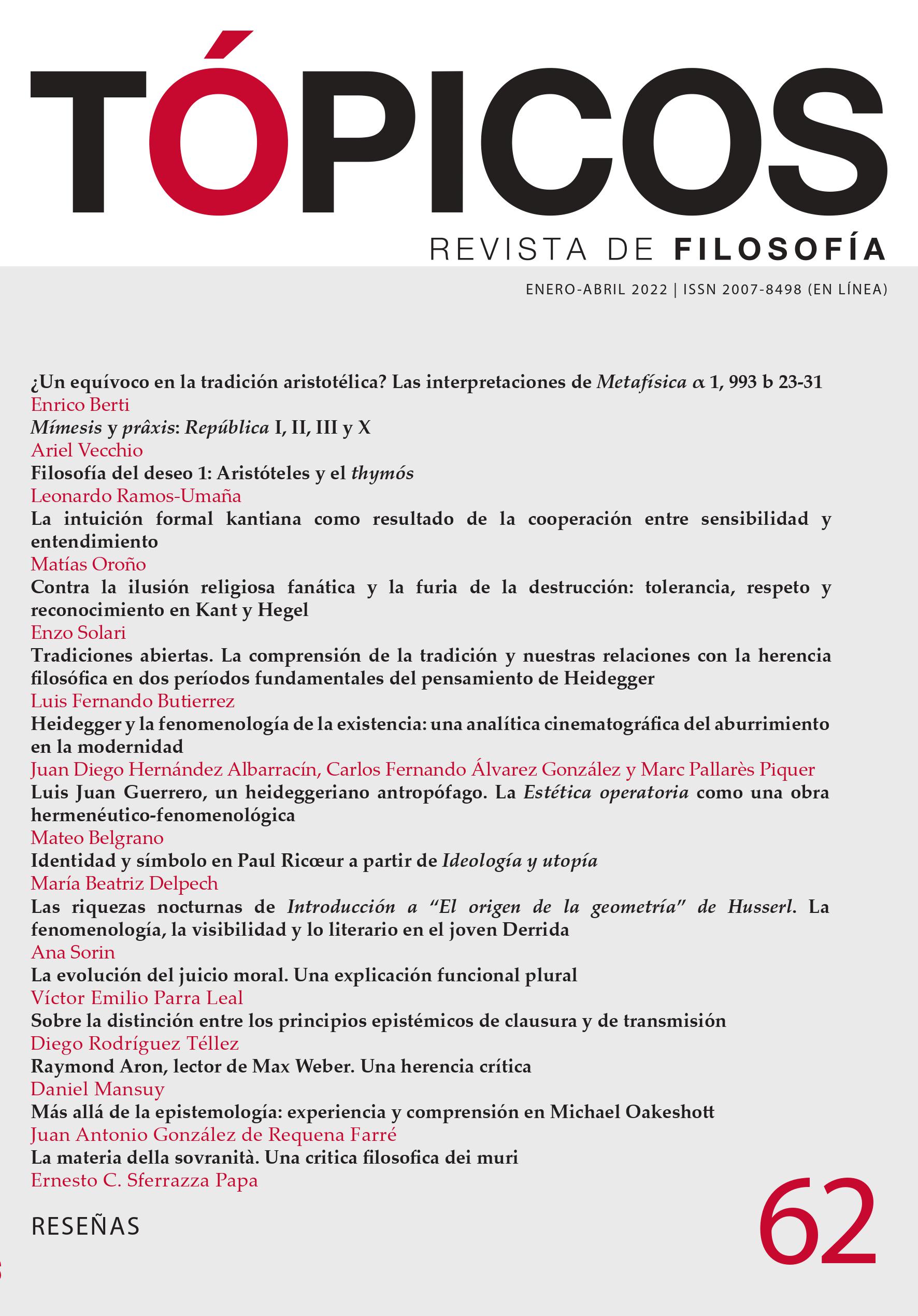Más allá de la epistemología: experiencia y comprensión en Michael Oakeshott
Publicado 2021-12-11
Palavras-chave
- epistemología,
- experiencia,
- comprensión,
- racionalismo
Direitos de Autor (c) 2021 Tópicos, Revista de Filosofía

Este trabalho encontra-se publicado com a Licença Internacional Creative Commons Atribuição-NãoComercial-SemDerivações 4.0.
Como Citar
Resumo
Habitualmente, la crítica al moderno proyecto epistemológico fundacional y a la concepción representacional del conocimiento se asocia con las filosofías de Heidegger y Wittgenstein. No obstante, en un epígono del idealismo británico como Michael Oakeshott también se puede reconocer un singular posicionamiento contra el fundacionalismo filosófico, contra la epistemología representacional, contra la teoría de la verdad como correspondencia y contra el racionalismo universalista. Este artículo pretende reconstruir la indagación filosófica de Oakeshott en torno a las condiciones de la experiencia y la comprensión humanas. Mediante la exégesis de sus ensayos filosóficos, proponemos una lectura integral de su reflexión sistemática sobre las modalidades del conocimiento humano, la cual aúna coherentemente motivos idealistas, escépticos y hermenéuticos más allá de las tentaciones de la epistemología tradicional.
Referências
- Alexander, J. (2012). Oakeshott as Philosopher. En E. Podoksik (ed.), The Cambridge Companion to Oakeshott. (pp. 7-41). Cambridge University Press.
- Boucher, D. (2012). Oakeshott in the Context of British Idealism. En E. Podoksik (ed.), The Cambridge Companion to Oakeshott. (pp. 245-273). Cambridge University Press.
- Boucher, D. y Vincent, A. (2012). British Idealism: A Guide for the Perplexed. Continuum.
- Franco, P. (2004). Michael Oakeshott: An Introduction. Yale University Press.
- Gadamer, H.-G. (2003). Verdad y método. I. A. Agud Aparicio y R. de Agapito (trads.). Ediciones Sígueme.
- Gadamer, H.-G. (2004). Verdad y método. II. M. Olasagasti (trad.). Ediciones Sígueme.
- Isaacs, S. (2006). The Politics and Philosophy of Michael Oakeshott. Routledge.
- López Atanes, F. J. (2010). Conducta humana y sociedad civil. Introducción a la filosofía política de M. Oakeshott. Unión Editorial.
- Marsh, L. (2005). Constructivism and Relativism in Oakeshott. En T. Fuller y C. Abel (eds.), The Intellectual Legacy of Michael Oakeshott. (pp. 238-262). Imprint Academic.
- Nardin, T. (2001). The Philosophy of Michael Oakeshott. The Pennsylvania State University Press.
- Oakeshott, M. (1966). Experience and its Modes. Cambridge University Press.
- Oakeshott, M. (2000). El racionalismo en la política y otros ensayos. E. L. Suárez (trad.). Fondo de Cultura Económica.
- Oakeshott, M. (2003). On Human Conduct. Clarendon Press.
- Oakeshott, M. (2009). La voz del aprendizaje liberal. A. Bello, (trad.). Katz.
- Oakeshott, M. (2013). Sobre la historia y otros ensayos. M. V. Rodil (trad.). Katz.
- Plotica, L. P. (2015). Michael Oakeshott and the Conversation of Modern Political Thought. State University of New York Press.
- Podoksik, E. (2003). In Defence of Modernity: Vision and Philosophy in Michael Oakeshott. Imprint Academic.
- Ricœur, P. (1990). Freud: una interpretación de la cultura. A. Suárez, M. Olivera y E. Inciarte (trads.). Siglo XXI.
- Rorty, R. (1989). La filosofía y el espejo de la naturaleza. J. Fernández Zulaica (trad.). Cátedra.
- Taylor. C. (1997). Argumentos filosóficos. F. Birulés Beltrán (trad.). Paidós.
- Tseng, R. (2003). The Sceptical Idealist: Michael Oakeshott as a Critic of the Enlightenment. Imprint Academic.
- Turner, S. (2005). The English Heidegger. Philosophy of the Social Sciences, 35(3), 353-368. DOI: https://doi.org/10.1177/0048393105277991.
- Wells, H. (1994). The Philosophical Michael Oakeshott. Journal of the History of Ideas, 55(1), 129-145. DOI: https://doi.org/10.2307/2709957.
- Worthington, G. (2002). The Voice of Poetry in Oakeshott’s Moral Philosophy. The Review of Politics, 64(2), 285-310.






